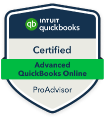
For most people, artificial intelligence draws up a picture of self-driving cars, robots programmed to manufacture and move products, and virtual assistants like Siri, Alexa, and Google Home. A simple example of automation is the auto fill text in our emails and application forms, which have become an integrated and seemingly unconscious process in our daily lives.
Much like the rapid rise of the digital era, AI and automation are going to revolutionize our world. The question is less about whether AI and automation has a place in the accounting and bookkeeping industry, but rather how it’s going to impact accounting professionals and small business bookkeeping across the globe.
What AI and automation does for accountants
There are many, many mixed emotions and messages circulating the Internet about AI and automation for accountants – including strong claims that the advancements will be “the death of accountants”. If you’re an accounting or bookkeeping professional, this can cause a wave of panic, but don’t worry – AI and automation can work in our favour and for the benefit of the client.
Keep in mind that accounting has been around for a very long time and has not only survived, but continues to thrive through centuries of massive change. At one point, it was difficult to imagine moving physical books to the very beginnings of computer accounting, and then again to accounting software. But as much as modern accounting has evolved from pen and paper to digitized books and cloud computing, AI and automation can very well make big and positive strides in the industry. Here’s what the generation of technology-savvy accountants can expect.
Do more with the resources we have
Automation already exists in accounting today – from taking care of administrative tasks, transaction tracking, keying in formulas, and reporting, just to name a few. As automation continues to improve, we as accounting and bookkeeping professionals can not only embrace change but use it to our advantage.
With the minutiae details off our plate, we’re able to devote more time and energy on interpreting the data for our clients. AI can gather, sort, and organize data into a visual presentation that can be used to determine the health of a business. Business owners can use this data to better strategize the direction and growth of their company.
Achieve more accurate financial reporting
AI can identify mistakes and anomalies quickly, such as duplicate invoices, odd numbers, and items in incorrect categories, for example. Accounting software already does this, but you can be sure to expect continuous improvements and an even smoother process as automation and AI continue to evolve.
Some of the benefits this provides accountants include:
- Minimizing accounting errors
- Reducing financial fraud
- More accurate reporting
- Minimizing the chances of duplicate or late payments
- Identifying issues before they arise
Helps protect businesses from financial challenges
AI rapidly gathers and organizes data, allowing accountants to perform cash flow forecasting more efficiently. Accountants can adjust expenditures based on the data received, take action to protect the business, respond to financial challenges before they happen and thus mitigating risk.
Further, AI can predict whether additional inventory can be fruitful or detrimental to the business based on market demand. Again, just a few examples of how accountants can help their clients strategize and grow their business with AI.
Final thoughts
There are plenty of resources out there that may paint the narrative as Artificial Intelligence and Automation vs Accountants and Bookkeeping Professionals, but it’s not the full picture. Rather, it’s more like key players that make up a strong team. Automation and AI-equipped accountants are an asset to businesses worldwide. While accounting principles remain the same, how we do the work continues to evolve – and that’s a good thing!














